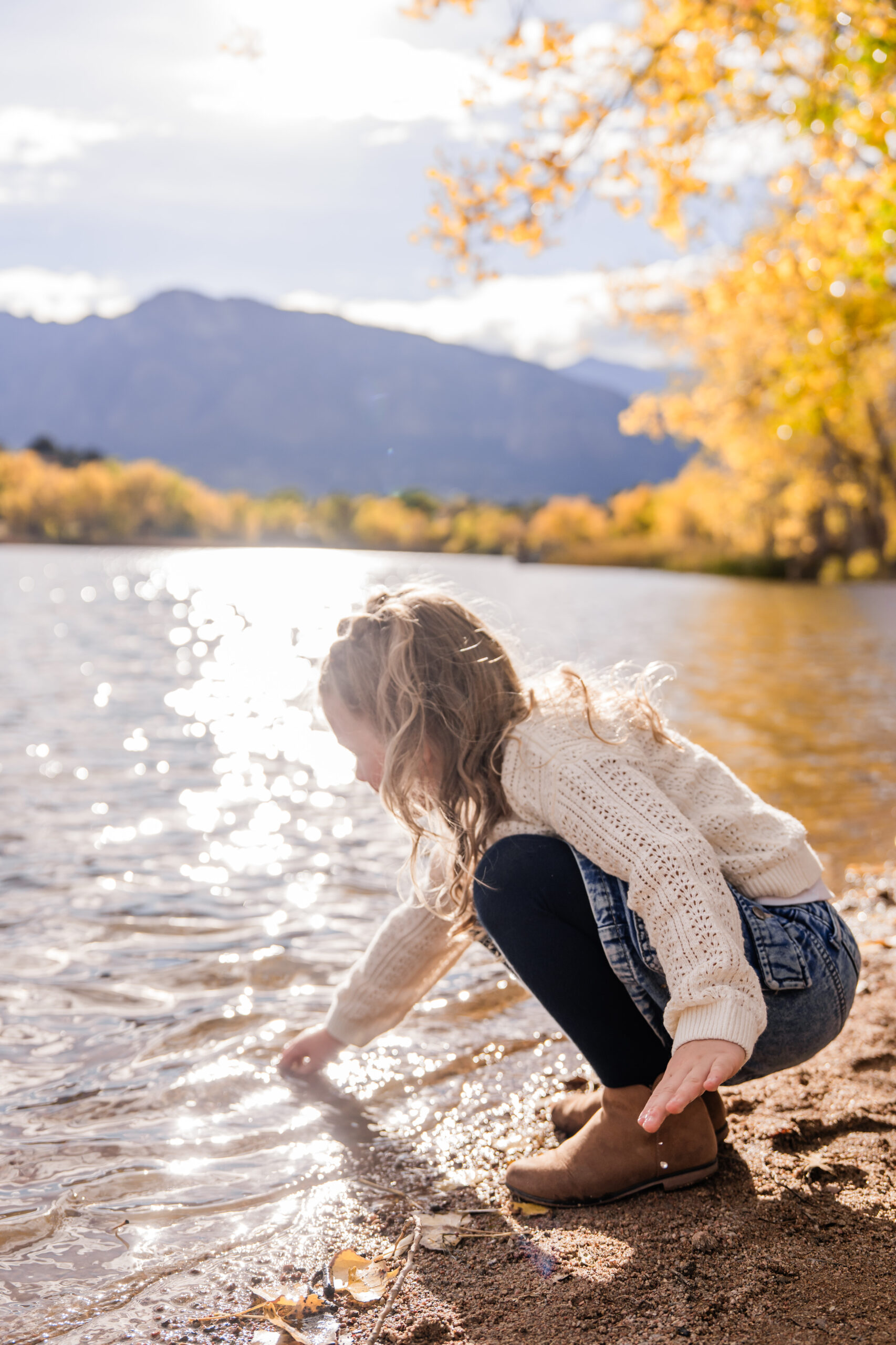Anxiety In Kids
Anxiety is a natural response to stress. It often presents itself before a new experience, like on the first day of school or before a sports game. Too much anxiety can cause your child to feel stuck. If your child feels so anxious that it’s getting in the way of daily activities, there’s a problem. It can be hard as a parent to know when your child is struggling with anxiety. Especially in young kiddos, we can often mistake acting out for pure misbehavior.
But it’s important to keep an eye on these behavioral changes. More often than not, if your child’s mood or behavior suddenly changes for the worse, their health needs to be addressed. I’m going to tell you signs to look for that may indicate your child is experiencing anxiety, when it’s a problem, and how to help your child heal holistically.
Signs and Symptoms of Anxiety in Kids
Kids can feel anxious about different things and at different ages. Many of these worries are a natural part of life. They come with growing up and experiencing new things. Some common signs of anxiety to look out for in your kiddo are…
- stomach aches
- irritability
- headaches
- crying
- tantrums
- compulsive behavior
- trouble sleeping
- clinging to your side
- worrying excessively
Many children experience these symptoms at some point in their life. Children go through many changes, and a little anxiety is a normal response to this.
Signs It’s Time to See Your Naturopathic Pediatrician
If the symptoms listed above become frequent or extreme, or you feel your child’s anxiety is getting in the way of everyday life, you should seek help from a professional.
If you notice your child…
- becoming hysterical, or hyperventilating
- having heart palpitations
- experiencing panic attacks
- changing overall mood
- refusing to go to school
- rejecting suggestions to try new things
… these are signs it’s time to ask for help.
Addressing anxiety early on will help prevent it from becoming a problem your little one carries into their adult life.
Identifying the Underlying Causes of Anxiety
As a naturopathic pediatrician, I don’t prescribe medication to temporarily relieve these symptoms. My work is to treat your whole child and help them truly heal, so they can grow up to be happy, confident adults. To do that, I get to the root cause. There are a few different factors that may be causing your child’s anxiety. This includes:
- Gut health issues
- Neurological or hormonal imbalance
- Genetics
- Toxic buildup
- Nutrient deficiency
I ask questions, and sometimes run tests, to determine what’s causing your child’s anxiety. Once I know this, I can develop the right treatment plan for them.
Treatments for Anxiety Using a Naturopathic Approach
I use different modalities to treat anxiety. You can implement some of these treatments on your own at home, too.
Let me tell you what I look at, and the natural medicines I prescribe to my patients.
Improving gut health
Did you know that 95% of our happy hormone – serotonin – is made in our gut? (1) It’s no wonder the key to treating anxiety often lies in repairing the gut.
When treating your child’s gut health, here’s what I prescribe:
- Food sensitivity testing. Check for food intolerances that may be harmful to your child’s gut health. When you get a test, you can find out in about 2 weeks what foods to eliminate from their diet.
- Nutritionally diverse diet. Focus on serving your child plenty of colorful fruits and vegetables. Be sure to also include digestives, like cinnamon, ginger, garlic, onion, pineapple and papaya. These foods help stimulate digestion and are amazing for our gut.
- Probiotics. Taking a supplement helps support the healthy gut bacteria. These friendly bugs are responsible for absorbing micronutrients so the body can produce neurotransmitters for mood balance.
- Hydration. Make sure your kiddo drinks plenty of water! This helps keep a healthy balance of gut bacteria and promotes overall health and wellbeing.
Nutritional and botanical supplements
- Magnesium has been proven to help decrease symptoms of anxiety. (2) I recommend taking a supplement. You can also sprinkle magnesium-rich seeds, like pumpkin or flax seeds, on top of your child’s cereal or yogurt.
- Omega-3 fatty acid is critical for supporting brain health and can reduce anxiety symptoms. (3) Again, I recommend a supplement, and you can add omega-3-rich foods to your child’s diet, too.
- Vitamin B-12 can help aid anxiety, too. B vitamins are essential for brain health and deficiency can lead to poor mood. (4)
- Herbs like lavender, chamomile, and lemon balm have a therapeutic effect on our nervous system and may help ease mild anxiety symptoms. (5) Give your child herbal tea or put an oil diffuser in their room.
Behavioral medicine
Because I spend some extra time with you, I get to learn more about your child’s relationships, sleep, daily habits, and health history.
My recommendations for treatment vary depending on what I hear from you and your child. I can suggest any of the following:
- Exercise, or playtime. Even better if this can be outside!
- Breathwork, or practicing deep breathing. We often forget to take deep breaths, and this is calming for our brains.
- Writing or talking about their worries. Have your child experiment with ways to express their anxiety. This often makes it feel more manageable.
- Adequate sleep. Poor sleep is linked to poor mood. Help your child prioritize their sleep. They should be getting quality, uninterrupted sleep each night.
How much sleep is “adequate?”
Use these science-based numbers as a guideline: (6)
- Infants 4-12 months: 12-16 hours
- Toddlers 1-2 years: 11-14 hours
- Preschoolers 3-5 years: 10-13 hours
- Grade Schoolers 6-12 years: 9-12 hours
- Teens 13-18 years: 8-10 years
*These numbers include nap times
No one treatment is right for every child. Working with your trusted naturopathic pediatrician to develop a tailored plan is the best way for your child to heal.
Ways You Can Help Your Child Cope With Anxiety
Here are a few other things you can do as a parent to help your child cope with anxiety:
- Talk to them. Ask them about their worries. Reassure them that everything will be okay.
- Set an example. Try not to become overprotective and anxious yourself. Instead, model healthy ways to deal with anxiety.
- Physical touch. Holding your child’s hand or giving them a hug can calm their nervous system and make them feel safe.
Simply being there for your child by providing support and encouragement is an important step in helping them manage symptoms.
You Are Not Alone
It’s hard watching your child suffer. And it’s difficult to know what to do for your child when they’re struggling with anxiety. You are not alone. And your little one doesn’t have to feel this way forever. If you or your child are feeling overwhelmed, please reach out to a professional you trust and ask for help. Are you looking for a naturopathic pediatrician in Colorado Springs? If you’d like to discuss a tailored solution for your child, book an appointment with me here.
Resources:
- https://pubmed.ncbi.nlm.nih.gov/19361459/
- https://www.ncbi.nlm.nih.gov/pmc/articles/PMC5452159/
- https://pubmed.ncbi.nlm.nih.gov/30264663/
- https://www.ncbi.nlm.nih.gov/pmc/articles/PMC6770181/
- https://www.ncbi.nlm.nih.gov/pmc/articles/PMC3612440/
- https://www.healthychildren.org/English/healthy-living/sleep/Pages/healthy-sleep-habits-how-many-hours-does-your-child-need.aspx



